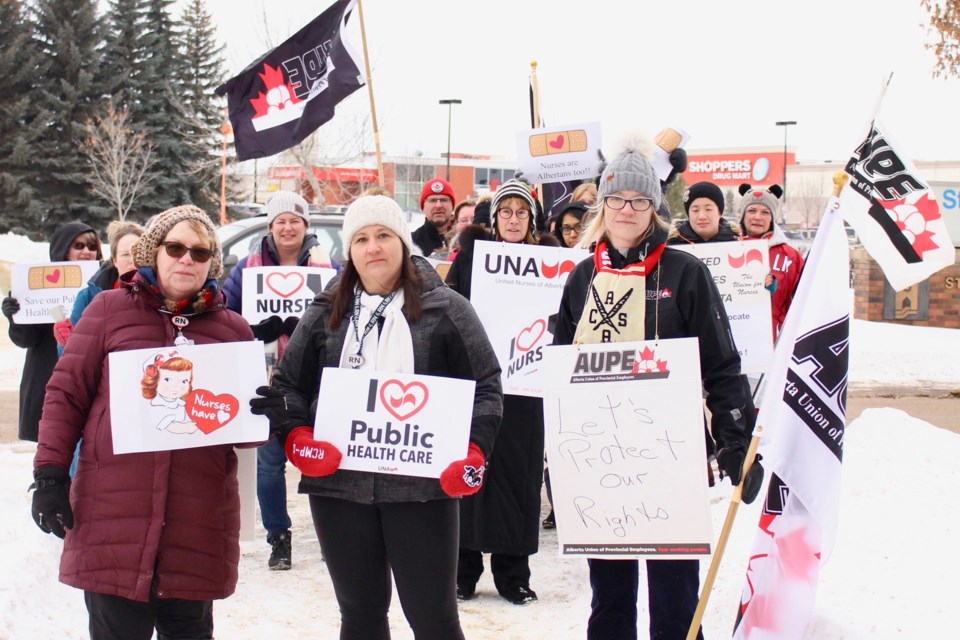Nurses at the Sturgeon Hospital are feeling optimistic after Alberta Health Services backed off some of the wage rollback proposed during salary negotiations, but say it is unlikely staff will accept any form of wage rollback from the government.
On Wednesday, Sept. 8, the province announced they would walk back the proposal to cut nurses' pay by three per cent, although the province is still asking to cut the lump sum payments nurses would receive, equating to a two-per-cent pay cut.
The government is also still asking for more control over nurses' scheduling, which currently allows for nurses' flexible and predictable schedules
Orissa Shima, president of the United Nurses Union local 85 at the Sturgeon Hospital, said her fellow nurses felt it was a move in the right direction, but still not close to a deal that would work for staff.
“I think that offered a little bit more optimism for people that maybe there was a willingness to move, but certainly not an appetite to accept what they had on the table,” Shima said.
Sharon Lloyd, a nurse at the Sturgeon Hospital who has been working for 35 years, said she is very happy that the government and Alberta Health Services have taken a step back prior to the mediation process.
“I’m absolutely happy they've paused on some of those things and we're still in negotiations,” Lloyd said.
Shima said right now there is a nursing shortage, and the province is in a health-care crisis, and other areas in Canada are offering competitive salaries and are trying to recruit nurses. The province needs to do more work to retain nurses, Shima said, which includes not cutting wages, or the province could be facing an even worse labour shortage in the field.
Debby Gale, a veteran nurse who has been working in the field for 39 years, said nurses don’t want a wage rollback during the pandemic.
“It's so hard to for nurses to stand up and say enough because we just say, ‘OK, we will make do.’ It comes to a point where you just can’t do that anymore and you have to stand up for yourself,” Gale said.
“We've just gone through hell and now they're going to roll back our wages.”
The last 18 months have been difficult for nurses and for veterans like Gale. They don't even compare to previous challenges nurses have faced.
“It's been the worst that it has been in the 39 years,” Gale said as her voice broke.
While nurses have done great work supporting each other and working together, Gale said the way the government is treating them makes them feel devalued.
“It just makes something that has been horrible that much worse,” Gale said.
During the past 18 months there has been a high level of anxiety, heightened awareness, and vigilance in hospital work environments, which is causing stress and burnout among staff, Gale said.
'Nobody will win if we strike'
Lloyd said nurses don’t want to strike, but job action may be looming, as there are many angry nurses who don’t want to accept wage rollbacks.
“Nobody will win if we strike. Patients will lose. No, we don’t want to strike,” Lloyd said.
Shima said the members of her local are engaged and listening, with almost 100 tuning in to online meetings for updates on the mediation process.
“Ideally, nobody wants to strike. Everybody wants an agreement, but none of them were willing to take what was on the table,” Shima said.
Nurses do not want a rollback in wages, Shima said, and while the recent offer to reduce the wage rollbacks is a step in the right direction, at the end of the day it still won’t work for the majority of nurses.
In August, the United Nurses of Alberta union (UNA) agreed to all of AHS's conditions for essential services, which are the conditions in the health-care system that must be upheld during a strike, bringing the province's 30,000 nurses one step closer to a strike, which would see staff reduced to 66 per cent across the province, with specific staffing requirements for each unit.
Unlike most employees who can walk off their jobs, nurses were once banned from striking altogether because if they leave their jobs, lives are put at risk.
The province was at the time asking the nurses to take a five-per-cent wage rollback, among other concessions.
Now AHS has changed its position as the two groups head into formal mediation.
Once a mediator is appointed, they have 14 days to try and bring the parties to an agreement. If that can't be achieved, recommendations may given by the mediator. The groups will go into a 14-day cooling-off period before they can take any action.
The nurses are asking for a two-per-cent pay increase per year, along with a request that AHS and the provincial government reveal publicly how much overtime is being used on each unit per year.




